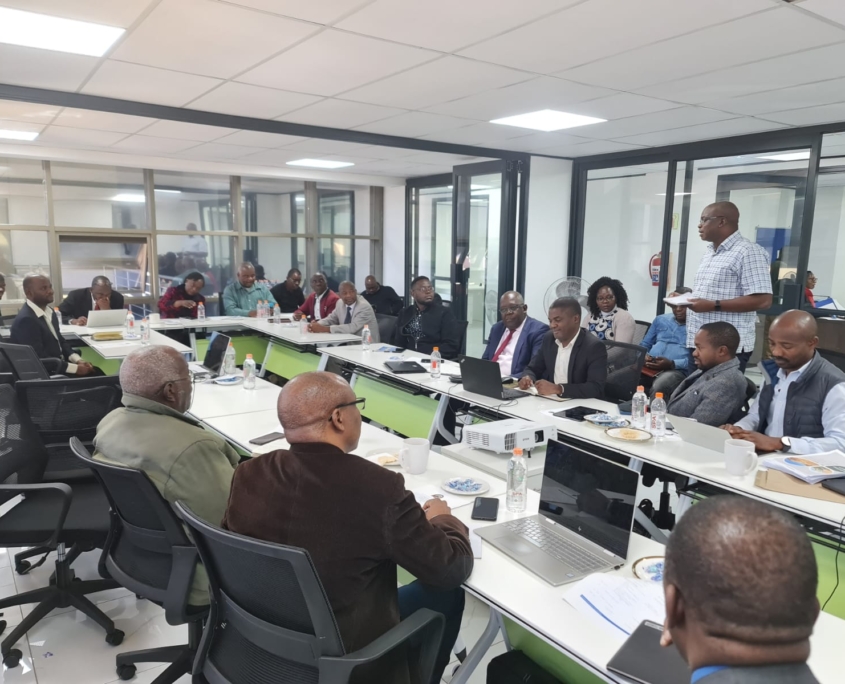I.T. Transport
Building strong institutional structures for efficient transport delivery services.
Building strong institutional structures for efficient transport delivery services.
This entails the development of terms of references and requests for proposals, Performance, and diagnostic reviews, preparation of action plans and strategies, capacity building and training, institutional/organisational reform, and policy reform.

At IT Transport, we prioritise institutional strengthening to ensure organisations operate effectively and achieve their goals. Performance and diagnostic reviews are integral to this process, identifying areas for improvement and driving positive change. Effective performance and diagnostic reviews offer significant institutional benefits. This is achieved by analysis of the performance across various dimensions, identifying strengths and weaknesses in efficiency, effectiveness, resource allocation, and best practice adherence. The approach involves scoping, data collection, stakeholder engagement, report preparation, and implementation with monitoring. Effective reviews lead to operational improvements, enhanced transparency, and increased stakeholder confidence.

Policy reform, for IT Transport, transcends mere procedural adjustments; it’s about driving organisational evolution in a dynamic business landscape, enhancing efficiency, resilience, and sustainability across diverse sectors. Our advocacy for policy reform begins with the meticulous formulation of precise Terms of Reference (ToR) and Request for Proposals (RFP), foundational documents fostering transparency, accountability, and alignment with organisational goals. Central to our methodology is the rigorous assessment of organisational performance through diagnostic reviews, identifying operational bottlenecks, regulatory hurdles, and systemic inefficiencies to pave the way for targeted interventions and strategic realignment.
Armed with insights from diagnostic reviews, we craft bespoke action plans and strategies tailored to your organisational context and aspirations, integrating best practices, emerging trends, and stakeholder perspectives for seamless implementation. Empowering the workforce of the organisations that we work with through customised capacity-building programmes and training initiatives, nurtures a culture of continuous learning, innovation, and adaptability, which, subsequently unlocks the full potential of human capital. Beyond policy reform, we specialise in institutional restructuring, policy advocacy, and organisational revitalization, orchestrating transformative change from the grassroots to the boardroom. Our commitment to driving sustainable change balances economic imperatives with social equity and environmental stewardship, ensuring equitable distribution of reform dividends across society.

At IT Transport, we understand the pivotal role of Action Plans and Strategies in propelling organisational progress and realising objectives. These tools, though closely linked, exhibit distinct levels of detail and focus. Strategies serve as high-level roadmaps, delineating long-term goals and overarching direction. Conversely, we use action plans to translate the strategies of our client organisations into actionable steps, specifying activities, timelines, responsibilities, and resource allocations required to accomplish our strategic aims.
Crafting effective action plans and strategies involves several critical steps. We commence with a situational analysis, evaluating our current landscape—including strengths, weaknesses, opportunities, and threats—to inform our understanding of existing programmes and legal frameworks. Stakeholder engagement follows, ensuring diverse perspectives are considered and fostering ownership. Next, we establish clear, measurable goals based on analysis and stakeholder input, prioritising activities and outlining resource allocations. Finally, we implement mechanisms for monitoring progress, measuring effectiveness, and adjusting as needed. These meticulously developed plans and strategies provide clarity, focus resources, facilitate progress measurement, and bolster accountability, serving as guiding documents on the journey for any organisation toward achieving a sustainable transportation environment.

At IT Transport, our specialty lies in offering comprehensive consultancy services tailored for transport projects, encompassing the development of both Terms of References (ToR’s) and Request for Proposals (RfP’s). With our expertise in this domain, we ensure projects are meticulously scoped, planned, and executed to precisely meet our clients’ unique needs and objectives. The development of ToR’s and RfP’s marks a pivotal stage in the project lifecycle, serving as the bedrock for successful implementation.
Collaborating closely with our clients, our team at IT Transport endeavours to grasp the project requirements, objectives, and desired outcomes, translating these insights into clear and concise documentation that accurately delineates the scope of work and expectations. Our approach to crafting ToR’s and RfP’s is characterised by methodical and detail-oriented processes. Alongside developing ToR’s and RfP’s, we prioritise capacity building and training, empowering our clients with the requisite knowledge and skills to manage and execute their projects efficiently. We offer tailored training programmes to equip project teams with the tools and resources essential for success. Moreover, recognising the significance of institutional, policy, and organisational reform in successful transport projects, our consultants possess extensive experience in facilitating such initiatives, aiding clients in navigating complex regulatory landscapes and streamlining project processes. In essence, the development of ToR’s and RfP’s stands as a pivotal facet of any transport project, and at IT Transport, our blend of expertise, experience and commitment to client satisfaction positions us as the ideal partner for all your transport consultancy requirements.

At IT Transport, we understand that organisational reform should focus on enhancing internal structures, processes, and culture within institutions, involving streamlining operations, improving communication channels, enhancing decision-making processes, and fostering a culture of innovation and performance. Meanwhile, institutional reform, with a broader scope, entails changes affecting an institution’s overall environment, including legal frameworks, regulatory landscapes, and external stakeholder relationships, possibly involving revising policies, establishing new regulatory bodies, or forging stronger partnerships. For example, in the context of road safety, reform is essential due to systemic challenges that often transcend individual institutions, such as outdated legal frameworks, fragmented governance structures, and insufficient funding for enforcement and infrastructure. Effective reform necessitates a collaborative approach involving various stakeholders, including government agencies responsible for legislative reforms and resource allocation, civil society organisations advocating for policy changes and raising public awareness, and international organisations providing technical assistance, guidelines, and best practices for road safety reform.

Our commitment to operational excellence permeates every facet of our business, driving us to continually innovate and enhance efficiency. Our Gap Analysis process further involves thorough diagnostic reviews, scrutinising key performance metrics, operational processes and customer feedback, to identify areas of strength and improvement. Leveraging insights gleaned from these reviews, we tailor action plans and strategies aimed at bridging identified gaps and seizing opportunities, always aligning our actions with overarching business objectives. Empowering our clients through targeted capacity building and training initiatives is integral to driving sustainable change and innovation

 Transport Economics and Planning
Transport Economics and Planning